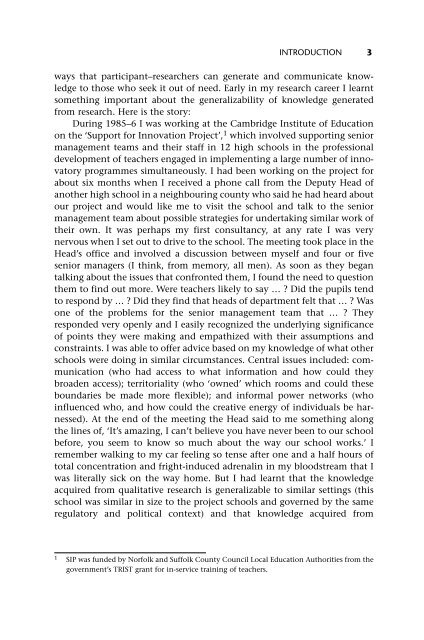Action Research A Methodology for Change and Development
Action Research A Methodology for Change and Development
Action Research A Methodology for Change and Development
You also want an ePaper? Increase the reach of your titles
YUMPU automatically turns print PDFs into web optimized ePapers that Google loves.
INTRODUCTION 3<br />
ways that participant–researchers can generate <strong>and</strong> communicate knowledge<br />
to those who seek it out of need. Early in my research career I learnt<br />
something important about the generalizability of knowledge generated<br />
from research. Here is the story:<br />
During 1985–6 I was working at the Cambridge Institute of Education<br />
on the ‘Support <strong>for</strong> Innovation Project’, 1 which involved supporting senior<br />
management teams <strong>and</strong> their staff in 12 high schools in the professional<br />
development of teachers engaged in implementing a large number of innovatory<br />
programmes simultaneously. I had been working on the project <strong>for</strong><br />
about six months when I received a phone call from the Deputy Head of<br />
another high school in a neighbouring county who said he had heard about<br />
our project <strong>and</strong> would like me to visit the school <strong>and</strong> talk to the senior<br />
management team about possible strategies <strong>for</strong> undertaking similar work of<br />
their own. It was perhaps my first consultancy, at any rate I was very<br />
nervous when I set out to drive to the school. The meeting took place in the<br />
Head’s office <strong>and</strong> involved a discussion between myself <strong>and</strong> four or five<br />
senior managers (I think, from memory, all men). As soon as they began<br />
talking about the issues that confronted them, I found the need to question<br />
them to find out more. Were teachers likely to say … ? Did the pupils tend<br />
to respond by … ? Did they find that heads of department felt that … ? Was<br />
one of the problems <strong>for</strong> the senior management team that … ? They<br />
responded very openly <strong>and</strong> I easily recognized the underlying significance<br />
of points they were making <strong>and</strong> empathized with their assumptions <strong>and</strong><br />
constraints. I was able to offer advice based on my knowledge of what other<br />
schools were doing in similar circumstances. Central issues included: communication<br />
(who had access to what in<strong>for</strong>mation <strong>and</strong> how could they<br />
broaden access); territoriality (who ‘owned’ which rooms <strong>and</strong> could these<br />
boundaries be made more flexible); <strong>and</strong> in<strong>for</strong>mal power networks (who<br />
influenced who, <strong>and</strong> how could the creative energy of individuals be harnessed).<br />
At the end of the meeting the Head said to me something along<br />
the lines of, ‘It’s amazing, I can’t believe you have never been to our school<br />
be<strong>for</strong>e, you seem to know so much about the way our school works.’ I<br />
remember walking to my car feeling so tense after one <strong>and</strong> a half hours of<br />
total concentration <strong>and</strong> fright-induced adrenalin in my bloodstream that I<br />
was literally sick on the way home. But I had learnt that the knowledge<br />
acquired from qualitative research is generalizable to similar settings (this<br />
school was similar in size to the project schools <strong>and</strong> governed by the same<br />
regulatory <strong>and</strong> political context) <strong>and</strong> that knowledge acquired from<br />
1 SIP was funded by Norfolk <strong>and</strong> Suffolk County Council Local Education Authorities from the<br />
government’s TRIST grant <strong>for</strong> in-service training of teachers.

















